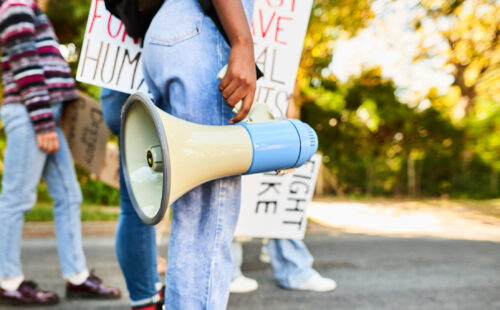
Table of Contents
How to Manage Election Anxiety (Even After Election Day)

Written By: Alex Bachert, MPH

Clinically Reviewed By: Chris Hinton
February 3, 2025
5 min.
A Charlie Health expert offers six tips for managing political stress and anxiety.
Learn more about our Clinical Review Process
Table of Contents
If this year’s election (or politics in general) is causing you anxiety, know that you’re not alone. A 2024 survey conducted by the American Psychological Association (APA) found that political concerns were a leading source of stress for adults in the United States. Other national reports concluded similar findings, with 70% of Americans feeling anxious about current events like the recent election.
“I think it is absolutely common and normal to experience anxiety and stress around the election and politics in general,” says Beth Couture, MSS, LSW, a Charlie Health Group Facilitator. “Many of us are profoundly affected in multiple areas of our lives by political decisions and actions, and this makes it difficult to avoid feeling anxiety and stress.”
Between tension with the recent election season and uncertainty regarding the future of the country, it’s no wonder people are in emotional distress. Read on for tips from Charlie Health about how to manage your stress levels and protect your well-being beyond election day.

Politics can take a toll on your mental health
Virtual treatment to manage any kind of mental health concern — including political stress.
Six tips for managing election anxiety
When the world feels uncertain, it’s helpful to focus on the factors that are in your control. Below are six tips to empower people to understand their emotions and prioritize their mental health.
1. Set clear boundaries
For approximately one-third of Americans, the current political climate has caused tension and strain among family members. If you feel attacked for your personal values or are struggling to see eye to eye with others, consider setting boundaries to protect your mental health and encourage respect in your relationships.
For example, if you have a friend, colleague, or family member who tends to make political comments, you can say: “I don’t feel comfortable talking about politics right now. Can we please avoid that subject?” In some cases, your boundary may involve distancing yourself from someone altogether.
2. Focus on what you can control
Another way to help manage political stress and anxiety is to focus on what is in your control. “There is a lot about politics that we have no control over, and this can make us feel helpless,” says Couture. “Focusing on the things we can do something about, no matter how small, can help us feel more empowered and can help us feel stronger and better able to do what we can do rather than keep us stuck in what we can’t.”
3. Limit your time online
“The 24-hour news cycle and the fact that we get news from so many different sources, including social media, make it difficult to detach ourselves from politics even when we know it’s in our best interest to do so,” says Couture. She suggests making an effort to take a break from your phone and limit your daily exposure to social media and political news.
“Put your phone in a locked drawer, or get an app that tracks the time you spend online and cuts you off after a certain number of minutes or hours,” Couture suggests. “It’s not easy, but pulling yourself away from political news and commentary can help us feel more grounded and present in our own lives.”

Yes, Politics Is Worsening People’s Mental Health — Here’s What the Data Shows
Charlie Health Editorial Team
4. Stay connected
Couture suggests finding ways to stay connected, such as volunteering and spending time with people who share your values. “Building and nurturing our own communities can also be really helpful,” says Couture. “Do what you can to help others, and let others help you as well.”
5. Practice self-care
Self-care involves making time for activities that help reduce political stress. This may look a little different for everyone and can include activities like exercise, meditation, journaling, and gardening. Self-care also involves getting enough sleep, so consider creating healthy sleep habits, such as following a consistent sleep schedule and maintaining a cool, quiet sleep environment.
“Do what is necessary to keep going and stay as healthy as you can. Regardless of what is going on in the country or the world, you are important and deserve care and love,” emphasizes Couture.
6. Focus on the present
If the election outcome wasn’t what you were hoping for, you may have some concerns about the future. Mindfulness exercises can help people bring their awareness to the present moment instead of worrying about events that are outside of their control.
Here’s one mindfulness technique that can be used anywhere: Choose a word or mantra to repeat when you need to feel grounded or centered. For example, “Peace” or “I exhale tension. I inhale calm.”
Talk therapy for stress and anxiety
Stress
Anxiety disorder
A temporary response to external pressures, often resolving once the situation improves.
Persistent, excessive worry and fear that can interfere with daily life, even after a trigger improves.
According to a national survey conducted by Forbes Health, more than 60% of U.S. adults say their mental health was slightly, moderately, or significantly negatively affected by the 2024 election. If your anxiety is severe enough to impact your daily functioning, consider meeting with a mental health professional to discuss your symptoms.
For some people, their symptoms may be a sign of generalized anxiety disorder (GAD), a condition defined by excessive worry about everyday events that are out of your control for at least six months. Some common signs of GAD include:
- Restlessness
- Being easily fatigued
- Headaches, muscle aches, or stomachaches
- Irritability
- Trouble falling or staying asleep
- Trouble controlling feelings of worry
Treatment may vary by person and severity of symptoms, but some common therapeutic techniques for managing anxiety include:
- Cognitive behavioral therapy (CBT)
- Acceptance and commitment therapy (ACT)
- Dialectical behavior therapy (DBT)

Manage your anxiety with Charlie Health
It’s normal to feel stressed or anxious about elections and politics. But if these feelings are impacting your ability to function, you may want to consider professional support. Charlie Health’s virtual Intensive Outpatient Program (IOP) offers more than once-weekly therapy for teens and young people dealing with complex mental health challenges—including anxiety and depression. Charlie Health combines group sessions, individual therapy, and family therapy to help each person manage their mental health in a way that feels right to them. Fill out the form below to start healing today.
References
https://medlineplus.gov/anxiety.html
https://www.apa.org/pubs/reports/stress-in-america/2024
https://www.health.harvard.edu/blog/do-i-have-anxiety-or-worry-whats-the-difference-2018072314303#:~:text=Anxiety%20in%20itself%20is%20not,you%20about%20a%20potential%20threat
https://news.gallup.com/poll/512576/teens-spend-average-hours-social-media-per-day.aspx
https://www.crisistextline.org/wp-content/uploads/2024/09/How-to-Cope-Election-Anxiety.pdf?_t=1727727104
https://www.forbes.com/health/mind/election-anxiety/




